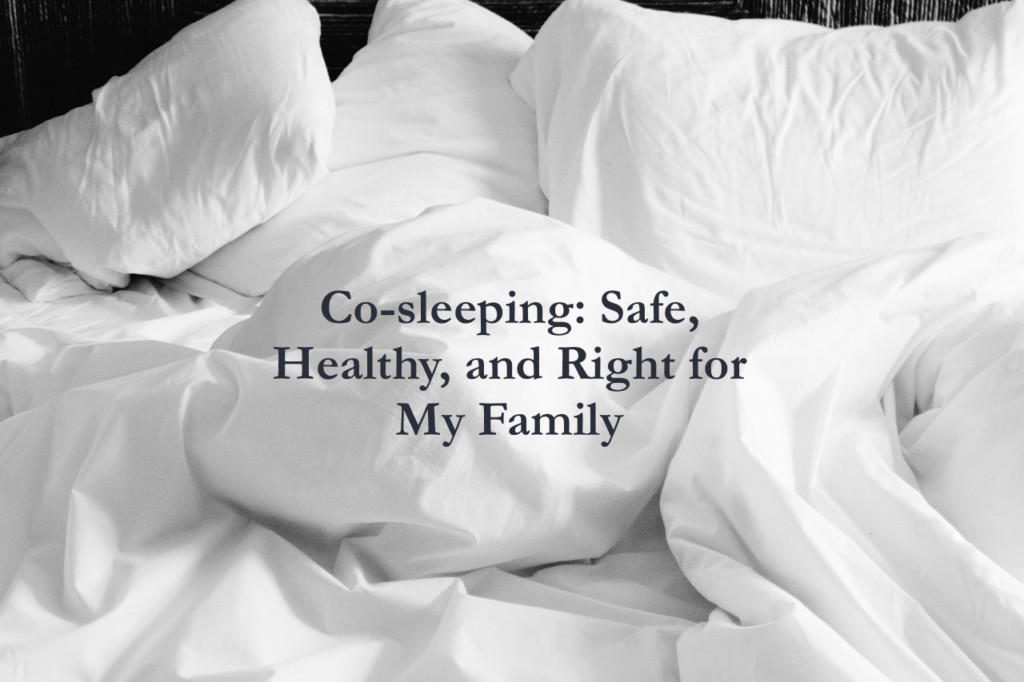Co-sleeping: Safe, Healthy, and Right for My Family
Of all the things that moms struggle with, sleeping seems to be pretty high up on the list. It seems that barely a day goes by when I don’t hear or read about a mom lamenting her lack of sleep or asking for sleep advice. We have strategies, and terms for our strategies: CIO (Cry it out), Ferber Method, The Comfort Cycle, Babywise, and many more.

Compounding the confusion is a litany of conflicting advice. Babies need to sleep in their own cribs. Babies should sleep through the night. Babies need to eat every three hours at night. Co-sleeping is biologically natural. Co-sleeping causes SIDs. Lay babies on their backs to sleep. Your mom says babies will only sleep on their tummies. No wonder new moms are on the brink of insanity. Between the proven torture of sleep deprivation, the hormones, and the burden of keeping an infant alive, the last thing we need is conflicting advice. But it’s everywhere. And no matter what you choose, there is a mom-group ready to judge you.
Here is my perspective.
I would like to say my perspective is immune from such controversy, but I’d be lying. So here’s the best I can offer: Take my perspective as one option. Not the only option. Maybe not necessarily the best option for you. But I’d like to suggest that it is an option that can be safe, nurturing and helpful. I absolutely know that it has been for my family and for many moms who have shared their experiences with me.
We co-sleep. Me, my husband, and whoever is the current baby of the family. Pre-parenthood, I didn’t expect to be a co-sleeper. I assumed that my baby would sleep in his crib, and boy did I try to make that happen. But after trying every method imaginable, I finally realized that all he wanted was what is natural after nine months in my body. He wanted closeness. Comfort. Human touch. And I needed sleep.
Survival and Safety
After 10 weeks, I had to go back to a full time job and I could not afford to be up and down all night. So for the sake of survival, he came into our bed. Safety was always a priority. Neither my husband or I smoke, drink, or use drugs (prescription or otherwise), which tends to be one of the highest risk factors for infant death in co-sleeping. We also used an in-bed co-sleeper which made it impossible for either of us to roll over him and also kept him from sinking into the mattress, but still allowed for the human touch he needed. When he outgrew the co-sleeper, he was big enough to take up his own space in the bed, which was more than his dad or I put together! But we were finally happy and rested.
Also of importance to me, it allowed for an easier breastfeeding relationship. He slept with us until he was about 18 months old, and then we transitioned him to a big boy bed. It took a few weeks (okay maybe months) until he finally wasn’t toddling into our room at 3am. But he was happy and secure. Since those days, twelve long years ago, I have learned so much about attachment theory. I now understand not just my own son’s needs, but the biological reasons behind WHY so many babies like him a tough time in the crib.
Do all babies respond this way?
No. My second son was a champion sleeper. He slept from 7pm to 7am every night, in his own crib. And he was happy about it! I could put him down semi-awake, and in the morning, he just called for me. His personality was different. He didn’t need to co-sleep, so we did what worked and put him in the crib.
Now we are on baby number three, our daughter, who will be our last. And we are back to co-sleeping. She and I had the most successful and longest nursing relationship of all three of my children, and co-sleeping was a major factor in that. She is now four and most nights she sleeps in her bed, but some nights in mine. Like my other two children, I know there will come a day where she will sleep in my bed for the last time. I have no concerns that she will be not be able to fully transition when the time is right.
Ditch the Guilt
What is concerning to me is that while so many moms I know are having the same experience as we are (they co-sleep), they are afraid to tell anyone! That information is shared in secret, only with close friends or me, as their therapist. They think that if anyone were to find out, CPS would be at the door that day, declaring them an unfit parent. But moms, we need to come out of hiding and we need to ditch the guilt once and for all.
Armed with the data on infant death, we should understand the causes and make sure we are doing what it takes to co-sleep safely. There is a misconception that co-sleeping is inherently dangerous, but the research simply does not support this. We also need to educate ourselves on attachment theory, which is a generally accepted theory of child development among psychology professionals. For too long, we have been fighting against nature, laying awake at night, listening to our infants’ lonely cries. And when they weren’t crying, we were getting up ten times a night to make sure they were still breathing! By morning, we were walking zombies, a safety hazard in its own right.
One question I tend to get from my clients on this issue is, what about sex? It’s a valid point. The needs of children always need to be balanced against the needs of the family as a whole, and the sexual relationship in marriage is certainly vital. My take on it is this: people who want to have sex are still having sex. In another room or bed, at another time of day, at nap time, in the morning, while baby is in a swing or even while baby sleeps in an alternate location before being transferred to the family bed. And one thing I overwhelmingly hear from dads is that they are willing to do anything that will help their wives feel more rested. In that way, I would argue that co-sleeping can actually help the relationship, as parents are much more likely to be in the mood when they aren’t sleep deprived.
Co-sleeping is not for every family, and as my middle child proved, it’s not even for every baby.
But it is happening among families everywhere. It is happening safely, and it is contributing to better breastfeeding and securely attached children. It is time that we stop being afraid to admit that co-sleeping can work and allow ourselves to come out of hiding. It is time that we admit, even proclaim, that nature and research are not in conflict when it comes to safe sleep practices and stand up to the hysterical masses that would call us bad moms.
What prompted me to write this article was a working mom on Facebook asking for recommendations on how to get her infant to sleep. The infant is crying it out to the point of vomiting, and the mom is exhausted. In all of the numerous comments of suggestions, not a single one recommended co-sleeping even though many of the commenters who I know personally DO co-sleep themselves. And I believe the only thing preventing them from offering that suggestion is the fear of being judged.
As for me, I’m done worrying about judgment. We are happy. We are secure. And best of all, we are rested.



















Thank you for writing this! Our family also enjoys safe bedsharing, breastsleeping, sleep!!